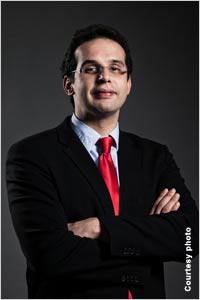For months, the world has followed the unrest and protest in North Africa stemming from unemployment throughout Tunisia and Egypt. America.gov asked several Tunisian entrepreneurs to share their stories of business development amid the strife in their region.
Mr. Nazeh Ben Ammar is President of the Tunisian American Chamber of Commerce and multimedia company, Excellencia. He recently spoke on entrepreneurial challenges in the Arab world with Jonathan Ortmans, President of the Public Forum Institute and senior fellow at the Kauffman Foundation. Read about their conversation on the Policy Forum Blog.

A man kisses the Tunisian flag during a demonstration in Tunis against high prices and unemployment.
Two major events took place in my mother country, Tunisia, while I was in the US. The first was in 1987, when I was completing my bachelor degree at Purdue University. The second was less than a month ago, and I was in California spending four days heading a delegation of major Tunisian entrepreneurs in the IT sector who were taking inspiration from the Silicon Valley spirit to help Tunisians back home.
I am quite accustomed to this environment as I spent nearly two years at Stanford University. My trip back to Silicon Valley was like a pilgrimage for me, 20 years after graduation. Having written my masters thesis on innovation and entrepreneurship, I felt I had returned to my roots. I have applied my studies during my career by focusing on bringing technology, innovative approaches and the entrepreneurship culture back to Tunisia.
For more than a year and a half now I have presided over the Tunisian American Chamber of Commerce (TACC). The chamber has a major role to play in today’s world in developing the entrepreneurial spirit, increasing investment from within Tunisia and the United States, and increasing trade between the two nations.
As a leader of an NGO, a trade company in electronics, an air conditioning company and a real estate company, I felt a lot of institutional pressure coming from a bureaucratic, police-like administration with the stick on our head coming either from customs or the Tunisian IRS. Our doctrine has been to remain ethical and environmentally friendly, which creates quite a challenge when surrounded by unethical practices.
I am proud to be part of the first revolution of the 21st century. The most challenging part is yet to come, and we Tunisians need to bring back our Phoenician, Carthaginian and Mediterranean character and strength of mind. The world is watching us.
The Tunisian American Chamber of Commerce will delegate in Washington, DC March 6-10, 2011.






 When Jeans Turn Green
When Jeans Turn Green




 American Indian Heritage Month
American Indian Heritage Month